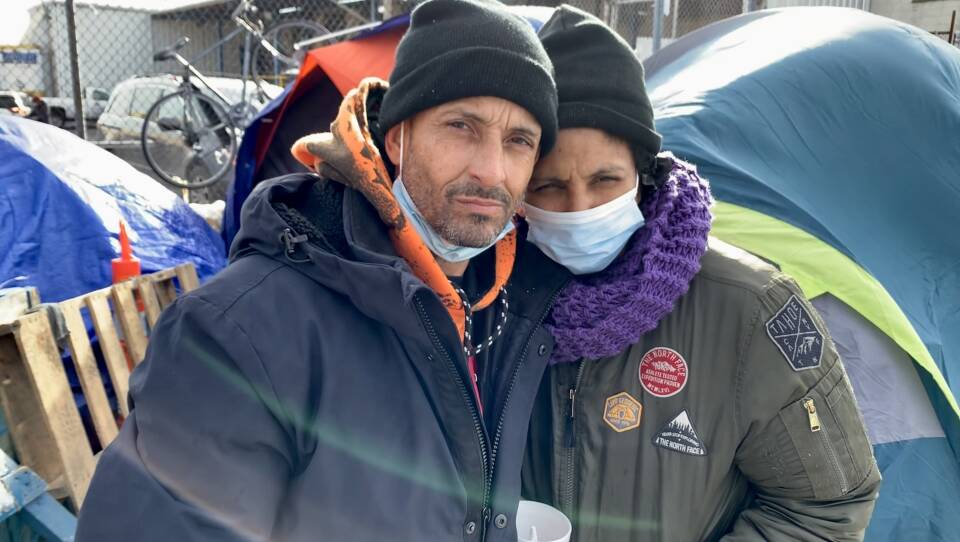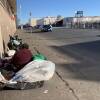Updated at 8:09 p.m.
As temperatures dropped into the single digits Tuesday night, Wilnelia Reabyng and Avalberto Delbrey held each other tightly for warmth in their makeshift tent, one of around 35 in the Newmarket Square area of Boston.
“It's very painful, you feel like your body's going numb,” Reabyng told GBH News. “You can’t feel your heart. You can’t feel anything.”
The next day, the couple’s tent was gone. Backhoes and excavators crashed through the encampment on Wednesday as city officials began clearing streets — for the third time since 2019 — around Melnea Cass Boulevard and Massachusetts Avenue, also known as Mass. and Cass, where a concentration of people experiencing homelessness and substance use disorder had created encampments.
The city posted eviction notices on tents last week that the area would be cleared on Jan. 12. In the months since the city’s last effort to clear tents from the area, city outreach workers have been attempting to connect people with housing. As of Tuesday night, workers had connected around 120 people with low-threshold living arrangements, Mayor Michelle Wu said.
“It is impossible to be fully safe and healthy living in a tent in winter in Boston,” Wu told reporters at a news conference Monday. “So we cannot wait even one more day, one more week to make sure that we’re connecting people to housing.”
Though the city’s executive order mandating the removal of tents under the threat of arrest still stands, Wu told reporters on Monday that law enforcement would not arrest those who refused to remove their encampments, to avoid “criminalizing any part of this process.”

Wu emphasized that her administration would deviate from previous attempts by city officials to clear the area by focusing on housing and “meeting each person where they are,” identifying specific health or housing needs and ensuring that congregate shelter would not be the only option. Housing options are available, Wu had said Monday, at several sites across the city, including the nearby Roundhouse Hotel, the Evision Hotel and the Shattuck hospital campus, both in Jamaica Plain.
But Reabyng and Delbrey, along with several others living in encampments in the area, were not provided permananent housing, and were instead told to stay at nearby shelters.
“Nothing is different about this,” Reabyng told GBH News. “The city is just doing the same thing as before.”
More Local News
Delbrey, who is HIV positive, and Reabyng, who has both lupus and stage III myeloma (a cancer of the blood cells), said they do not feel safe staying in a congregate setting at either the Woods-Mullen Shelter or a facility on Southampton Street, where they feel they are at risk of COVID-19 exposure.
“People there are sneezing, coughing. They don’t wear masks. It’s terrifying,” Delbrey said. “Because of my health and her health, I prefer to stay outside and not be around people. I don’t want to risk our lives.”
After losing their tent, the couple says they don’t know where they’ll go next, though the city has placed them on a waiting list for housing.
“I have a couple of blankets, I got some clothing there,” Delbrey said, gesturing to a pile of bags on the ground. “So, you know, I’ll just go into a corner and wait for God to give me a sign.”
Caitlyn, who asked GBH News not to use her last name, removed the last of her belongings into a city-provided storage bin before an excavator came down on her encampment. “It’s my own fault for not finding housing,” Caitlyn said, watching her belongings being scooped up into the mouth of a backhoe.
Some 30 tents and structures are being destroyed at the Newmarket st encampment near mass and cass @GBHNews pic.twitter.com/JKXzyRdnoL
— Tori Bedford (@Tori_Bedford) January 12, 2022
Tara, who asked GBH News not to use her last name, said: “It’s not that I choose to be out here. I’ve asked for help from my therapist, from my social worker, from the shelters. I’ve called the numbers, and people don’t call me back. I don’t understand the process, how they’re doing it, because some people get into hotels and some people are still in the street. I’m doing the best I can, I’m staying clean, but in order for me to be stable, I can’t be in the street right now, and the city’s not helping me.”
Tara said she and some 20 other people spent the night nearby on Atkinson Street, where she built herself a shelter out of cardboard boxes and wood pallets. She said she couldn’t sleep or feel her limbs — but, for her, it was still a better option than shelter.
“Shelters treat you like dogs. They treat you like an animal,” she said. “And if you say one thing back, you get kicked out for a month. We’re a number there in a jail, or we’re just like an alien to them.”
At the engagement center, a community health center providing food, medical care and daytime shelter on Atkinson Street, Stephanie, who asked GBH News not to use her last name, stretched her hands as far as she could, her fingernails crusted with dirt and her knuckles swollen from frostbite.
“I couldn’t feel my toes,” Stephanie said, after spending Tuesday night under a tarp on Atkinson. “My chest was so tight and the shivering was exhausting me — but if you fall asleep like that, you won’t feel the cold and you know you’re going to die from it.”
Stephanie said her tent was flattened by last week’s snowstorm, leaving her with just a tarp. She said she’s been living on the street at Mass. and Cass, in and out of shelter, where her belongings have been stolen, for three years. “Hopefully today is the last day,” she said.
Sam, a 61-year-old who has been living on Mass. and Cass since April and asked GBH News not to use his last name, said he plans to ask around about finding housing — but he’s not optimistic about the city’s long-term plans.
“There is really no permanent housing solution for individuals like me who are looking to have a roof over their head permanently,” Sam said. “I can’t get permanent housing and I have to decide whether to stay in a shelter and get robbed or jumped or stay out on the street.”

The Wu administration has described a multi-faceted plan to get people stabilized and into short-term, low-threshold housing before exploring more medium- and long-term options, according to city officials. In a survey conducted last month, city officials identified 145 unsheltered individuals living in the Mass. and Cass area. Those who participated in the survey were connected to low-threshold housing, while unsurveyed people will be provided a congregate shelter option, Wu told GBH News Wednesday.
"In terms of people who may not have been living in the encampments at the time of the survey and have since moved here ... we will continue to work on these medium- and long-term solutions so that every single person has a roof over their head," Wu said. "The need is very deep and it goes beyond the city of Boston, it goes beyond the state of Massachusetts."
Earlier this month, Wu and a group of city officials visited the Long Island campus, a shelter that closed in 2014 due to safety issues with a connecting bridge.
“It is full of potential,” Wu said after the visit, describing the necessary repairs as “a timescale of months or years.”
The city of Boston and the Boston Public Health Commission did not provide a timeline regarding the city’s plan to house people displaced from encampments, particularly those who were not included in the city’s survey. The total number of people placed in housing or congregate shelter after Wednesday’s tent-clearing and the number of tents that were removed will be made available to the public at a media availability with Wu on Thursday morning, according to a spokesperson from the mayor’s office.
Reabyng, who was not included in the city’s survey, said she hopes to be off the waiting list for housing soon.
“They’re telling me to keep fighting, but I don’t know how much longer I can keep fighting this,” she said, sipping apple juice at the engagement center. In the past month, Reabyng says she has lost 104 pounds from chemotherapy-related nausea. Even when she can access food, Reabyng says she can’t keep it down. The scariest danger, she said, is the ever-present threat of COVID-19.
“I’m already sick enough and I don’t want to get more sick,” Reabyng said.
Reabyng said she lost seven people in her family to COVID-19. Before the pandemic, the 40-year-old from Worcester was working as a personal care assistant, but her high-risk medical status and history of cancer made it unsafe for her to be around patients.
“I lost my job because of my medical conditions, and then I lost my apartment because bills don’t pay themselves,” Reabyng said. “I feel like nobody right now, I feel like people don’t even see me as a human being. You can’t judge someone for being homeless. Everybody has a different reason for being here. Someone can just be one missed paycheck away from living on the street.”

After the sun set and the last tents were cleared from Atkinson Street and in Newmarket Square, Wu returned to Atkinson, where a huddle of around 50 people stood just outside on Southampton, blocked by a line of tape and a group of police officers.
"Today was really a transition. Today was not the first day of work here, and it's certainly not the last day," Wu told GBH News, surveying the now empty street. "This has really been a huge effort to create housing that meets people where they are, in a way that the city hasn't done before. This was our goal to make sure we were getting out root causes of mental health and substance use and being unhoused. We're going to continue to expand our city-wide approach, work with regional partners and get our long-term plans going."
Mass. and Cass czar Dr. Monica Bharel said the street was blocked off "for everyone's safety" while heavy equipment was brought in. She said outreach workers had "gone out several times" to speak to the crowd just outside the police tape, and "every single one of them has been spoken to and offered an option other than being outside."
When asked about Delbrey and Reabyng, who said no one had offered them an alternative to shelter, Bharel asked to see them directly. Within minutes, city officials arranged to transport the couple to a hotel room for the night. As they drove off in a white van, others approaching the police line were turned away from the nearby shelters, which had reached capacity.
Atkinson Street and the facilities there, including a methadone clinic and a medical facility, will be open on Thursday, Bharel said. She added that Thursday is when the real work begins.
"The outreach is ongoing," she said. "It was happening long ago and it will continue to do go on every single day."
This story was updated to include details from the evening.









